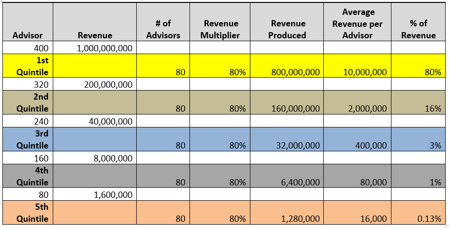
In my series (see previous posts) regarding the constraints to growing sales, the two remaining topics are:
- Ineffective motivation of the sales team
- The “just enough is good enough” approach to hitting setting and hitting goals
THE POWER OF THE “RIGHT” MOTIVATION
Ineffective motivation of the sales team is not uncommon and it is the subject of one of the more frequent questions people ask me: “Tony, how do I keep my sales people motivated?” My first response is normally a question in return: “Do you know what motivates your people?” The most common answer: “Well, uh, yeah, I think so.” I cannot help myself when I ask, “Do you know or do you think you know?” Their most common answer: “I think I know.”
With that in mind, how do you possibly motivate people when you just think you know what motivates them?
What we know about motivating salespeople is that it has changed over the years. When we first started evaluating sales teams using the #1 Sales Evaluation Assessment – Objective Management Group Sales Evaluation and Impact Analysis – the findings told us that people were externally motivated. Motivation was money and the things money can provide. Today, however, we see a different set of results (Read this HBR article on motivating salespeople).
The current findings tell us that sales teams are highly motivated to succeed, but the source of motivation is internal rather than external. They are motivated by a job well done. They want to be recognized for success and they are motivated by achieving their own personal standards for success and achievement.
I was 9 years old when I walked off the football field the very first time. I had just finished practice and my dad was waiting on the sideline for me. He asked me what I thought and I told him I loved it. “Someday I’m going to go to college to play football.” Dad asked me if I was sure and I said “yes.” He then told me, “College football players are in great shape so, if you are going to play college football, you’ll have to be in great shape. Take off your helmet and shoulder pads and start running some laps.” I followed his advice and I ran laps every night after practice to get in shape to play college football. In February of 1973, I signed my letter of intent to go to the University of Connecticut to play football.
My dad - my manager - knew my goal and used that occasionally to keep me on track. Occasionally, when I would fall off the training wagon, he would ask me if I still planned on playing college football. I would always answer, “Sure!” He would then say, “Well, I wasn’t sure. I haven’t seen you run or lift weights in a while.” That’s all he needed to say. Off I went.
When you know what motivates your people, you can then have the appropriate discussions to keep them on track.
“JUST ENOUGH” IS NEVER GOOD ENOUGH
“Just enough is good enough.” THIS MINDSET DRIVES ME CRAZY! How do you know that this is your culture?
- Year over year growth is one of the metrics you use to determine if you are getting better
- Comparing one unit in your organization against another is the way you communicate to the teams about which ones are having success – stack ranking and comparing the rank of one team against the others as a way to explain, “If they can go from #22 to #15, then so can you!”
- Hitting sales goals on the backs of the few
- You have people on your sales team who - month after month, quarter after quarter and year over year - fail to hit their sales goal.
- I don’t mean those that are at 99% one year and 101% the next and then 95% the third
- I mean those that consistently perform in the low 90’s or high 80’s.
- Those people that fail to perform still earn incentive comp, are not subject to any disciplined approach to improving skills or changing behaviors
- There is never a discussion that sounds like, “What happened to the superstar sales person I thought I hired ____ number of years ago?”
I understand how this happens. There is so much pressure to just hit the numbers that, at the end of the day, it really doesn’t matter how you hit the numbers; you just have to hit them. But what are the long-term consequences of this sales environment?
- Turn over of really good producers that are tired of carrying the load
- Producers who are close to being really successful manage themselves downward instead of upward.
- They witness that there are no consequences for failure
- They become “at leasters” – “I’m not as good as Julie, but at least I’m not as bad as John.”
- Recruiting top talent is difficult because, when they talk to your top performers, they tell them that there will be a lot of pressure to perform because nothing happens to the slackers and the company depends on the top producers to make up the difference.
- When goal setting time comes around, people at the top get more heaped on them and those in the middle to bottom of pack argue that the goal you give them was never one they bought into.
SETTING THE BAR FOR SUCCESS
Bottom line is:
- Organizations have to have a mind-shift first about what it means to be successful in the organization.
- There have to be systems and processes in place to catch failure before it happens rather than when it actually happens. Failure never happens all at once. It’s gradual; however, instead of addressing the issues when they appear, managers put salespeople on “double secret probation.”
- The metrics used to determine success have to include diagnostics of the improvement of quintiles year over year. (See chart below for a snapshot of quintile performance.) The idea is that when you take the snapshot next year, the numbers for each quintile have to be better than the previous quarter, year, etc.
- A willingness and commitment to set the bar higher for success and then hold people accountable to actually DOING the THINGS required to be successful rather than just looking at training data.

I will continue to explore and discuss these constraints to consistent and predictable sales growth.
Additional Resources:
The 80/20 of the 80/20 - What it means for your company and next steps
Get a FREE TRIAL of the #1 Sales Candidate Assessment

